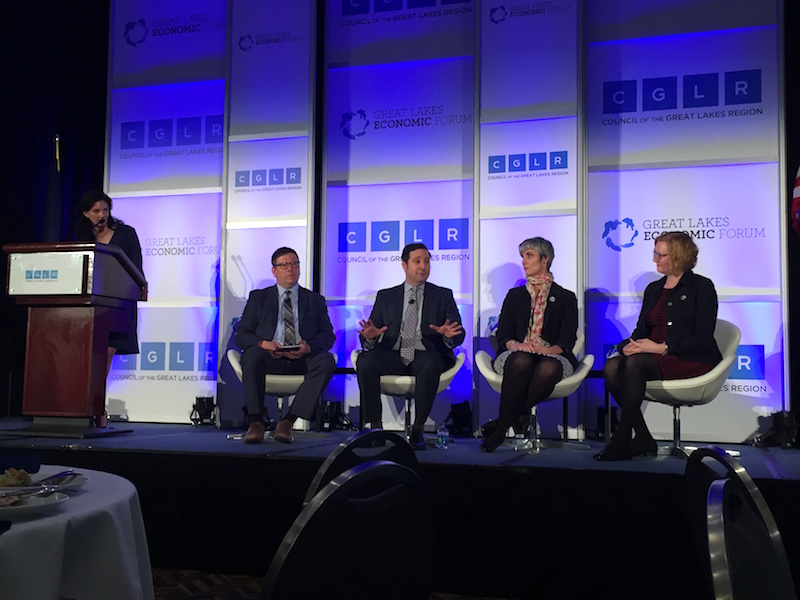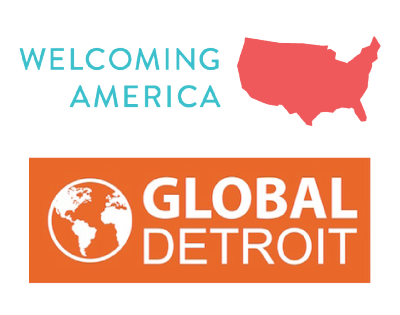Great Lakes Economic Forum Highlights Immigrant Economic Development Strategies

Bill Anderson, Director of the Cross-Border Institute at the University of Windsor, kicked off the third Great Lakes Economic Forum talking about the incredible competitive advantages that are generated by the “complementaries” inherent to a bi-national border economy between the U.S. and Canada, the most valuable border trade relationship on the planet. Simply put, companies and consumers in the U.S. and Canada benefit by having Canadians do things where they have competitive advantages, and Canadian companies and consumers benefit by having Americans do things where we have competitive advantages. If you’re married or live with a partner, you probably have an innate sense of this—my wife is the better negotiator on buying a home or car and I’m more adept (and willing) to make the lasagna or Chinese eggplant dinners (although overall she’s the better cook).
The Great Lakes Economic Forum, hosted by the Council of the Great Lakes Region, brings together several hundred leaders from around the region to share ideas and insights that will help shape economic policy, boost the Great Lakes region’s competitive edge, and secure its long-term success in a global economy. This year’s bi-national forum held at venues in Detroit, Michigan, and Windsor, Ontario, provided a platform to discuss the growing movement of immigrant economic development on both sides of the border.
Immigrants bring their own set of “complementaries” to our local and regional economies. They often possess the STEM, agricultural, and service sector skills, knowledge, and passion that are critical to our economic future. Immigrant entrepreneurs are important job creators in North America’s high-tech industries, as well as in Main Street businesses in disinvested and distressed urban neighborhoods. Immigrants add to our diversity of thought and culture and are part of the national identity of both the U.S. and Canada.
Working with the Welcoming Economies Global Network (WE Global), CGLR helped organize a panel discussion at this year’s forum to discuss how four metros in Michigan, Ohio, and Ontario are turning to immigrants to help revitalize neighborhoods and meet the talent demands of the new economy. Leaders from Global Cleveland (Joe Cimperman), Global Detroit (Steve Tobocman) (NOTE both Global Cleveland and Global Detroit are core members of WE Global), Global Hamilton (Sarah Wayland), and the Toronto Region Immigrant Employment Council (Margaret Eaton) discussed innovative programs they are implementing around skilled immigrant integration (addressing so-called “brain waste”), international student retention, immigrant entrepreneurship, and neighborhood revitalization. The panel sought to introduce the region’s economic, political, and diplomatic leaders to these emerging practices of immigrant inclusion and integration in mainstream economic development.
Marion E. Fantetti, Business Ombudsman, WindsorEssex Economic Development Corporation, an attendee of the conference noted that “The Panel discussion was indeed insightful, informative, and passionate – a definite resource for all economic development groups.” Fantetti believes that “The exchange of ideas and best practices will be a great asset for working collaboratively in promoting the benefits and potential of immigrant economic development, and with understanding how [these innovative programs focusing on immigrant inclusion] will help us prepare and build a robust, talented, and dynamic workforce to ensure the continued economic growth and prosperity of the Great Lakes Region.”
WE Global is looking forward to continuing our partnership with CGLR and deepening the dialogue and networking between WE Global members and their Canadian peers who, while operating within a different national immigration structure, share many of the same opportunities, innovations, successes, and challenges as programs in the Rust Belt region do in the U.S.



